形容词副词讲义
形容词副词讲义(精选.)

形容词副词定义:中文的意思是“……的”的词是形容词,用来修饰名词;中文意思是“……地”的词是副词,用来修饰动词、形容词或副词形容词与副词在句中的位置形容词形容词的比较级在句中的位置名词所有格副词的比较级形容词副词的转换考点清单练习:练习①It is a ____(sun) day.②It is a _____(rain) day.③I think you are a _____(luck) girl.④The teacher said he had _____to tell us.A. anything importantB. important anythingC. something importantD. important something⑤Look !Jack is ____(excite,excited) .⑥I feel ____(happy) every day.⑦The baby is sleeping ,please keep______(quiet,quietly)考点二:形容词的比较级(1)在形容词词尾加上“er”“est”构成比较级、最高级:bright(明亮的)—brighter—brightest broad(广阔的)—broader—broadest cheap(便宜的)—cheaper—cheapest clean(干净的)—cleaner—cleanest clever(聪明的)—cleverer—cleverest cold(寒冷的)—colder—coldestcool(凉的)—cooler—coolest dark(黑暗的)—darker—darkest dear(贵的)—dearer—dearest deep(深的)—deeper—deepestfast(迅速的)—faster—fastest few(少的)—fewer—fewestgreat(伟大的)—greater—greatest hard(困难的,硬的)—harder—hardest high(高的)—higher—highest kind(善良的)—kinder—kindestlight(轻的)—lighter—lightest long(长的)—longer—longestloud(响亮的)—louder—loudest low(低的)—lower—lowestnear(近的)—nearer—nearest new(新的)—newer—newestpoor(穷的)—poorer—poorest quick(快的)—quicker—quickest quiet(安静的)—quieter—quietest rich(富裕的)—richer—richestshort(短的)—shorter—shortest slow(慢的)—slower—slowestsmall(小的)—smaller—smallest smart(聪明的)—smarter—smartest soft(柔软的)—softer—softest strong(强壮的)—stronger—strongest sweet(甜的)—sweeter—sweetest tall(高的)-taller-tallestthick(厚的)—thicker—thickest warm(温暖的)—warmer—warmest weak(弱的)—weaker—weakest young(年轻的)—younger—youngest (2).双写最后一个字母,再加上“er”“est”构成比较级、最高级:big(大的)—bigger—biggest fat(胖的)—fatter—fattesthot(热的)—hotter—hottest red(红的)—redder—reddestsad(伤心的)—sadder—saddest thin(瘦的)—thinner—thinnestwet(湿的)—wetter—wettest mad(疯的)—madder—maddest(3).以不发音的字母e结尾的形容词,加上“r”“st”构成比较级、最高级:able(能干的)—abler—ablest brave(勇敢的)—braver—bravest close(接近的)—closer—closest fine(好的,完美的)—finer—finest large(巨大的)—larger—largest late(迟的)—later—latestnice(好的)—nicer—nicest ripe(成熟的)—riper—ripestrude(粗鲁的)—ruder—rudest safe(安全的)—safer—safeststrange(奇怪的)—stranger—strangest wide(宽广的)—wider—widestwise(睿智的,聪明的)—wiser—wisest white(白的)—whiter—whitest(4).以字母y结尾的形容词,把y改为i,再加上“er”“est”构成比较级、最高级:busy(忙碌的)—busier—busiest dirty(脏的)—dirtier—dirtiestdry(干燥的)—drier—driest early(早的)—earlier—earliesteasy(容易的)—easier—easiest friendly(友好的)—friendlier—friendliest funny(好玩的)—funnier—funniest happy(开心的)—happier—happiest healthy(健康的)—healthier—healthiest heavy(重的)—heavier—heaviesthungry(饿的)—hungrier—hungriest lazy(懒惰的)—lazier—laziestlucky(幸运的)—luckier—luckiest naughty(调皮的)—naughtier—naughtiest noisy(嘈杂的)—noisier—noisiest pretty(美丽的)—prettier—prettiestsilly(傻的)—sillier—silliest spicy(辣的)—spicier—spiciestthirsty(渴的)—thirstier—thirstiest ugly(丑的)—uglier—ugliest(5).双音节、多音节形容词,在单词前面加上“more”“most”构成比较级、最高级:afraid(害怕的)—more afraid—most afraidbeautiful(美丽的)—more beautiful—most beautifulcareful(仔细的)—more careful—most carefulcheerful(开心的)—more cheerful—most cheerfulcrowded(拥挤的)—more crowded—most crowdeddangerous(危险的)—more dangerous—most dangerousdelicious(美味的)—more delicious—most deliciousdifficult(困难的)—more difficult—most difficultexciting(令人兴奋的)—more exciting—most excitingexpensive(昂贵的)—more expensive—most expensivefamous(著名的)—more famous—most famousfrightened(受惊的)—more frightened—most frightenedfrightening(令人害怕的)—more frightening—most frighteninghard-working(勤奋的)—more hard-working—most hard-workinghelpful(有帮助的)—more helpful—most helpfulhonest(诚实的)—more honest—most honestimportant(重要的)—more important—most importantinteresting(有趣的)—more interesting—most interestingpolite(有礼貌的)—more polite—most politeterrible(可怕的)—more terrible—most terribletired(累的)—more tired—most tired(6).不规则变化的形容词:bad(坏的)—worse—worst far(远的)—farther—farthest (far—further—furthest) good(好的)—better—best ill(病的)—worse—worstlittle(少的)—less—least many(多的)—more—most much(多的)—more—most old(年老的)—older—oldest ( old—elder—eldest) well(好的,身体好的)—better—best练习1. Is your friend ____ (young) than you ?2. Shanghai is one of ______ (big) cities in the world.3. Do you think English is _____important than maths。
形容词和副词用法总结归纳讲解

C.especiallyD.luckily
12._____, the thief didn’t take anything valuable but my notebook.
A. Strange it isB. To be strange
C. Strangely enoughD. It was strange
C. surprisinglyD. hardly
4.—What do you think of the plan?
—I feel_____that we ought to give it up at once.
A. strongB. stronger
C. stronglyD. it strong
5.【1993全国】She doesn’t speak_____her friend, but her written work is excellent.
Watch hite意思是“晚”;lately意思是“最近”。如:
What have you been doing lately?
3.deep与deeply
deep意思是“深”,表示空间深度;deeply时常表示感情上的深度,“深深地”。如:
He pushed the stick deep into the mud.
8._____, he didn’t fail in the exam.(luck)
9.He was _____ ill and I was _____ sorry for that. (terrible)
10.It was _____ (extreme) cold that day and the meeting was _____ (especial) important.
高考英语复习形容词和副词知识点讲解讲义(必考点)
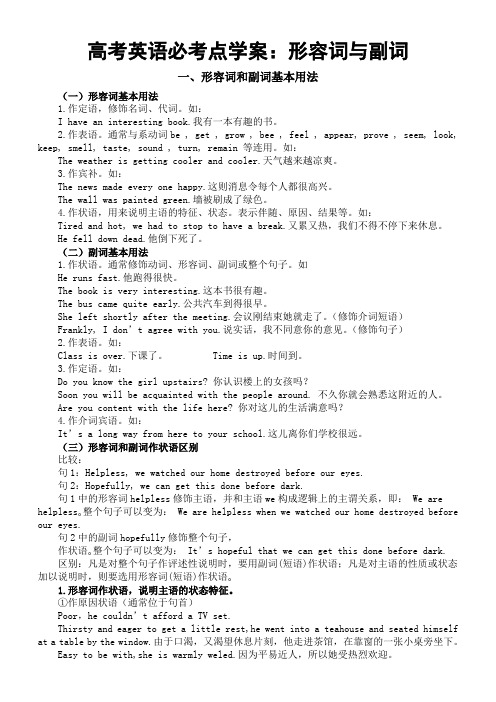
高考英语必考点学案:形容词与副词一、形容词和副词基本用法(一)形容词基本用法1.作定语,修饰名词、代词。
如:I have an interesting book.我有一本有趣的书。
2.作表语。
通常与系动词be , get , grow , bee , feel , appear, prove , seem, look, keep, smell, taste, sound , turn, remain 等连用。
如:The weather is getting cooler and cooler.天气越来越凉爽。
3.作宾补。
如:The news made every one happy.这则消息令每个人都很高兴。
The wall was painted green.墙被刷成了绿色。
4.作状语,用来说明主语的特征、状态。
表示伴随、原因、结果等。
如:Tired and hot, we had to stop to have a break.又累又热,我们不得不停下来休息。
He fell down dead.他倒下死了。
(二)副词基本用法1.作状语。
通常修饰动词、形容词、副词或整个句子。
如He runs fast.他跑得很快。
The book is very interesting.这本书很有趣。
The bus came quite early.公共汽车到得很早。
She left shortly after the meeting.会议刚结束她就走了。
(修饰介词短语)Frankly, I don’t agree with you.说实话,我不同意你的意见。
(修饰句子)2.作表语。
如:Class is over.下课了。
Time is up.时间到。
3.作定语。
如:Do you know the girl upstairs? 你认识楼上的女孩吗?Soon you will be acquainted with the people around. 不久你就会熟悉这附近的人。
语法专题 形容词副词讲义(全国通用) 2022届高考英语二轮复习
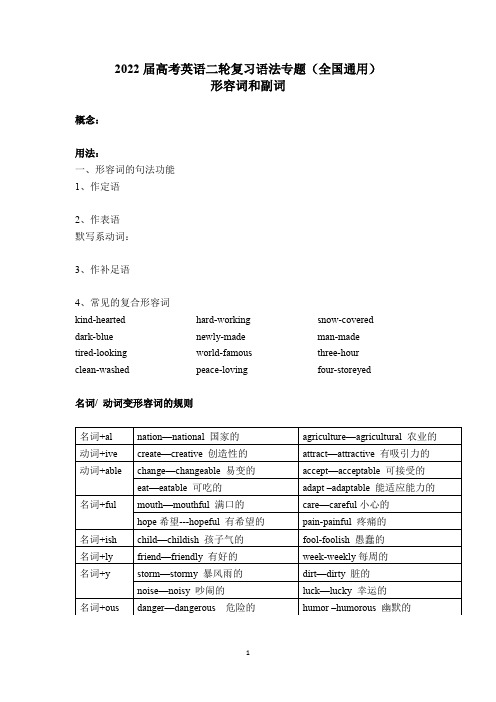
2022届高考英语二轮复习语法专题(全国通用)形容词和副词概念:用法:一、形容词的句法功能1、作定语2、作表语默写系动词:3、作补足语4、常见的复合形容词kind-hearted dark-blue tired-looking clean-washed hard-workingnewly-madeworld-famouspeace-lovingsnow-coveredman-madethree-hourfour-storeyed名词/ 动词变形容词的规则名词+al nation—national 国家的agriculture—agricultural 农业的动词+ive create—creative 创造性的attract—attractive 有吸引力的动词+able change—changeable 易变的accept—acceptable 可接受的eat—eatable 可吃的adapt –adaptable 能适应能力的名词+ful mouth—mouthful 满口的care—careful小心的hope希望---hopeful 有希望的pain-painful 疼痛的名词+ish child—childish 孩子气的fool-foolish 愚蠢的名词+ly friend—friendly 有好的week-weekly每周的名词+y storm—stormy 暴风雨的dirt—dirty 脏的noise—noisy 吵闹的luck—lucky 幸运的名词+ous danger—dangerous 危险的humor –humorous 幽默的二、副词的句法功能作状语三、易混淆的词1、hard—hardly例:He works hard. He hardly smokes.2、late—lately —later — latest例:She always come back late.Lately, I have had trouble sleeping.She came back 3 days later.I got the latest album of Jay.3、-ly结尾的形容词friendly , lovely, lonely, lively, deadly(致命的),elderly (年龄较大的),yearly, monthly, daily, weekly,be likely to (可能做某事)四、常考的几组副词用法:1、though意为:2、besides意为:3、however意为4、therefore意为:5、instead 意为:6、ago和beforeA、ago一般用于B、beforeadj. 变adv.的规则slow—slowly 缓慢地exact—exactly 精确地natural—naturally 自然地obvious—obviously 显然地happy-happily angry—angrilynoisy--noisilyterrible—terribly 糟糕地gentle --gently 温柔地possible—possibly 可能地simple – simply 简单地comfortable ---comfortably 舒适地probable—probably 可能地fortunate—fortunately 幸运地polite –politely 礼貌地rude—rudely 粗鲁地complete—completely 完全地特殊:true—truly真实地energetic –energetically 有活力地basic—basically 基本上automatic—automatically 自动地scientific—scientifically 科学地原级比较级最高级第一类tall taller tallest第二类largenice largernicerlargestnicest第三类easyhappy easierhappiereasiesthappiest第四类(辅元辅)hotthinhotterthinnerhottestthinnest第五类importantquickly more importantmore quicklymost importantmost quickly第六类不规则good/wellbad/badly/illoldmuch/manybetterworseolder/eldermorebestworstoldest/eldestmost一、形容词/ 副词原级用法1、as..as.. 和..一样(as+形容词/ 副词原级+as) , not as..as.. 不如...2、as+形容词+a/an+可数名词单数+as二、形容词/ 副词比较级用法 1、比较级+than ,表示:更….2、比较级+and+比较级, 表示:越来越….3、the+比较级, the+比较级 表示:越…越…4、比较级前可以用_________________________________等词来修饰,表示程度。
形容词和副词讲义
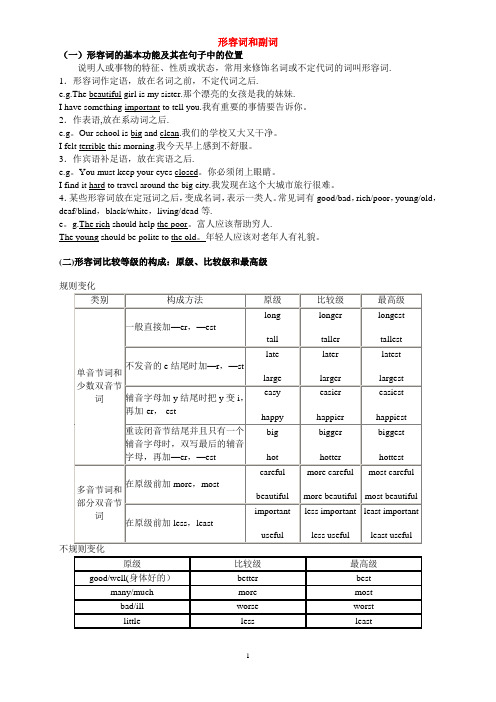
形容词和副词(一)形容词的基本功能及其在句子中的位置说明人或事物的特征、性质或状态,常用来修饰名词或不定代词的词叫形容词.1.形容词作定语,放在名词之前,不定代词之后.e.g.The beautiful girl is my sister.那个漂亮的女孩是我的妹妹.I have something important to tell you.我有重要的事情要告诉你。
2.作表语,放在系动词之后.e.g。
Our school is big and clean.我们的学校又大又干净。
I felt terrible this morning.我今天早上感到不舒服。
3.作宾语补足语,放在宾语之后.e.g。
You must keep your eyes closed。
你必须闭上眼睛。
I find it hard to travel around the big city.我发现在这个大城市旅行很难。
4.某些形容词放在定冠词之后,变成名词,表示一类人。
常见词有good/bad,rich/poor,young/old,deaf/blind,black/white,living/dead等.e。
g.The rich should help the poor。
富人应该帮助穷人.The young should be polite to the old。
年轻人应该对老年人有礼貌。
(二)形容词比较等级的构成:原级、比较级和最高级规则变化不规则变化(三)形容词原级用法1.说明人或事物自身的特征、性质和状态时用形容词原级。
The boy is too young。
这男孩太小了。
Math is very difficult。
数学很难.3.表示A与B在某一方面程度相同或不同时用形容词原级。
(1)肯定句中的结构:“A…+as+形容词原级+as+B”e.g。
English is as interesting as Chinese。
形容词、副词讲义

eg. Bajie is a lazy pig. He said something exciting. The girl is cute. 一. 形容词(表示性质或特征) (一)形容词的基本用法:修饰名词或代词,作定语或表语 1. 形容词+名词 eg. Shenyang is a beautiful city. 2. 系动词+形容词 eg. Miss Yu looks young. 3. 复合不定代词+形容词 eg. She often reads something interesting. 4. 形容词+ enough eg. Is it warm enough for you? 5. 多个形容词的顺序:好美小高状其新,彩色国料加用途 两张小圆桌 一件又脏又旧的棕色衬衫 two small round tables a dirty old brown shirt 一张新的漂亮的黑色中式木制大圆桌 (二)形容词的位置 exercise 1. It is very cold. Please keep the door and windows ________. A. open B. closed C. close D. opened 2. Is this room ______ the meeting? A. big enough to have B. enough big to have C. big enough having D. enough big having 3. Mary ’s mother bought a ________ coat for her yesterday. A. new blue silk B. blue new silk C. new silk blue D. blue silk new(三)形容词的构成1. 名词变形容词2. 复合形容词由“数词+名词”构成的复合形容词中,名词要用单数形式,且数词和名词之间要用连字符。
初中英语形容词副词讲义

第六讲形容词和副词教学目标1.掌握形容词和副词的基本用法2. 学会形容词和副词的比较等级3. 熟记形容词和副词的变化规则4. 利用形容词和副词的相关知识答题。
课程类型新授课课程时长 1.5h重点句子1.The Spring Festival is the most important traditional festival in China春节是中国最重要的传统节日。
2.Thanks to the government,our hometown has developed rapidly in recent years.The living conditions are much better and more comfortable.多亏了政府,我们的家乡近几年发展迅速,生活条件变得更好,更加舒适课堂导入Heavy Heavier The heaviestThe pig is heavy .The lion is heavier than the pig.The elephant is the heaviest of the three.考点一形容词和副词的基本用法[拓展] 形容词的其他用法(1)“the+形容词”表示一类人或物,如:the old 老人。
(2)形容词常用句式:①“It's+adj.+for+sb.+to do sth.” 表示“做某事对某人来说是……的”。
在这一句型中,常用描述事物性质的形容词,如: easy, difficult, important, dangerous等。
例:It is important for us ________ (work) hard.①“It's+adj.+of+sb.+to do sth.” 表示“某人做某事是……的”。
在这一句型中,常用描述行为者的性格、品质的形容词.如: good, kind, nice, polite, clever, foolish, lazy, careful等。
高中英语 高中简明语法系列---形容词副词分类与功能讲义

形容词形容词(Adjective)用来修饰名词或代词,描绘人和事物的特征。
形容词在句中一般用作定语、主语补语或宾语补语。
补语性形容词和定语性形容词根据形容词的句法功能,形容词可以分为补语性形容词和定语性形容词。
多数形容词既可以作名词的修饰语又可以作主语的补语。
1.只能作补语的形容词(1)以a-开头的形容词,如alone 单独,asleep 熟睡的,awake醒着的,alive活着的,alike 同样的,afraid 害怕,ashamed羞愧看下例:He is fast asleep in his bedroom.他在卧室熟睡。
We are fully aware of the difficulty.我们充分认识到困难。
I felt ashamed of my terrible mistake.我为自己的严重错误感到羞愧。
Paul was again absent from the meeting.鲍尔开会再次缺席。
(2)表示健康状况的形容词well 健康,ill 患病,faint 虚弱。
例如:I didn't feel well, but the doctor said it was nothing serious.我感觉不舒服,可医生说没什么要紧。
His strength grew faint as he was getting on in years.他上了年纪,体力虚弱。
(3)某些表示情感和心理状态的形容词。
例如:I'm glad of your great success in your study.我为你学习上的巨大成功感到高兴。
Shella was sorry about what she had done.希拉对自己的行为感到后悔。
My grandfather is fond of cycling.我祖父喜欢骑自行车。
He is content with his present job and position.他满足于自己的工作和地位。
完整word版形容词与副词讲义
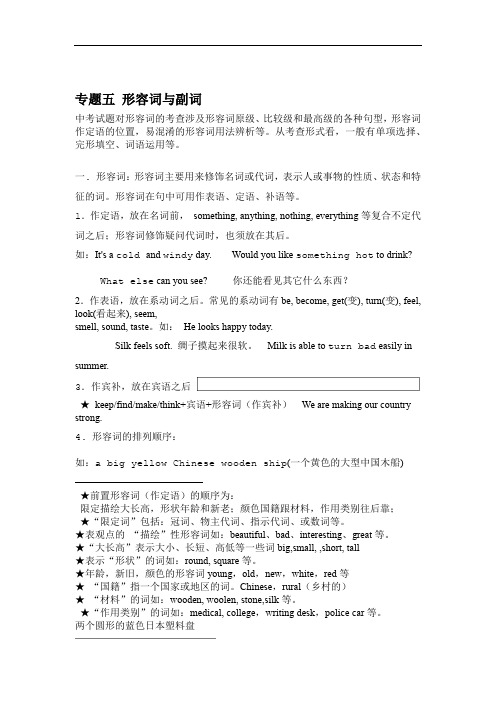
专题五形容词与副词中考试题对形容词的考查涉及形容词原级、比较级和最高级的各种句型,形容词作定语的位置,易混淆的形容词用法辨析等。
从考查形式看,一般有单项选择、完形填空、词语运用等。
一. 形容词:形容词主要用来修饰名词或代词,表示人或事物的性质、状态和特征的词。
形容词在句中可用作表语、定语、补语等。
1.作定语,放在名词前,something, anything, nothing, everything等复合不定代词之后;形容词修饰疑问代词时,也须放在其后。
如:It's a cold and windy day. Would you like something hot to drink? What else can you see? 你还能看见其它什么东西?2.作表语,放在系动词之后。
常见的系动词有be, become, get(变), turn(变), feel, look(看起来), seem,smell, sound, taste。
如:He looks happy today.Silk feels soft. 绸子摸起来很软。
Milk is able to turn bad easily in summer.3.作宾补,放在宾语之后★keep/find/make/think+宾语+形容词(作宾补)We are making our country strong.4.形容词的排列顺序:如:a big yellow Chinese wooden ship(一个黄色的大型中国木船)★前置形容词(作定语)的顺序为:限定描绘大长高,形状年龄和新老;颜色国籍跟材料,作用类别往后靠;★“限定词”包括:冠词、物主代词、指示代词、或数词等。
★表观点的“描绘”性形容词如:beautiful、bad、interesting、great等。
★“大长高”表示大小、长短、高低等一些词big,small, ,short, tall★表示“形状”的词如:round, square等。
初中英语语法之形容词与副词的基本用法讲义(含部分答案)

教学内容形容词和副词知识结构形容词一、形容词的定义形容词是描述人或事物的特征、性质、属性及状态的一种词类,主要用来修饰名词或代词。
二、形容词的句法功能成分说明例句作定语一般放在所修饰词的前面It’s a cold and windy day today. 今天是个寒冷、有风的天气。
1)表示发生时间的副词:►It’s beginning to rain now! 现在开始下雨了!2)表示频繁程度的副词,也称频度副词always, often, usually, sometimes, never, ever, hardly等一般位于系动词、情态动词和助动词之后,实义动词之前。
►She often changes her mind. 她常改变主意。
3)还有一些其他表示时间的副词:►He has just had an operation. 他刚动过手术。
2. 地点副词:here, there, out, somewhere, abroad, home1)有不少表示地点的副词:►She is studying abroad. 她在国外留学。
2)还有一些部分与介词同形的副词。
它们与介词同形,后跟宾语的是介词,否则是副词:①用作介词:Stand up!起立!①用作副词:A cat climbed up the tree. 猫爬上了树。
3)以where构成的副词也是地点副词:It’s the same everywhere. 到处都一样。
3. 方式副词:well, fast, slowly, carefully, quickly1)英语中有大量方式副词,说明行为方式(回答how的问题):►How beautifully your wife dances. 你夫人舞跳得真美。
2)还有相当多的副词,表示某些情绪:►She smiled gratefully. 她感激的笑了笑。
3)还有一些以-ly结尾的副词,表示动作发生的状况:►He left the town secretly. 他悄然离开了这座城市。
形容词和副词英语语法讲解

• 1.She is my best firend ,so I know her very __
• A.good B .fine C.nice D.well
• 解析D本体考察的是形容词修饰名词。副词修饰动词的用 法本句意思是他是我的好朋友,因此我很了解他本句要修 饰是动词故用副词well
四、形容词和副词的比较等级
2. This building looks not so (as) high as that one.
3. This room is three times as large as that one.
比较级 1. 构成形式: - er more
注意不规则变化
more worse less
better farther further
原级
1. 肯定
2. 否定 3. 倍数源自as + adj. / adv. 原级 + as
not as (so) + adj. / adv. 原级 + as 倍数 + as + adj. / adv. 原级 + as
•
twice a larger than
倍数+ the size (height, length, width) + of 如:1. Mr. Sun speaks English as fluently as you.
• “…得多”:many, much, a lot, far, by far • “更,甚”:even, still
4. 比较级句型表达最高级含义 + any other + 单数名词
比较级 + the other + 复数名词 + any of the other + 复数名词
高考英语复习核心形容词副词汇总讲义(生气困惑平静特别)

高考英语核心形容词和副词一、生气1.angry /ˈæŋɡri/ adj.生气的【反】delighted adj.高兴的;令人愉快的get angry 生气;发脾气be angry at/with sb./sth.生……的气[e.g.] I was really angry with her.我很生她的气。
[e.g.]There is no need being angry with others about the mistakes they unconsciously make.{应用文—建议信}没必要为别人无心犯下的错和他们生气。
make sb.angry 使某人生气[e.g.] It made me really angry.我很生气。
2.mad /mæd/ adj.生气的;发疯的like mad 疯狂地;极快地go mad 疯了be mad at/with sb.对某人生气[e.g.]You are not supposed to be mad at your sister.你不该对你妹妹生气。
be mad for sb./sth.为某人/某物着迷[e.g.]Tom is mad for basketball.汤姆对篮球十分着迷。
make/drive sb.mad 使人恼火[e.g.]Her silly questions drives me mad.她愚蠢的提问使我恼火。
【扩展】furious /ˈfjʊəriəs/ adj.生气的二、困惑1.puzzled /ˈpʌz(ə)ld/ adj.感到困惑的puzzled look 迷惑的表情be puzzled about/at/as to…对……感到困惑[e.g.]I have been puzzled as to why British people like to talk about weather.{应用文—书信}我一直很困惑为什么英国人喜欢谈论天气。
小升初形容词副词讲义
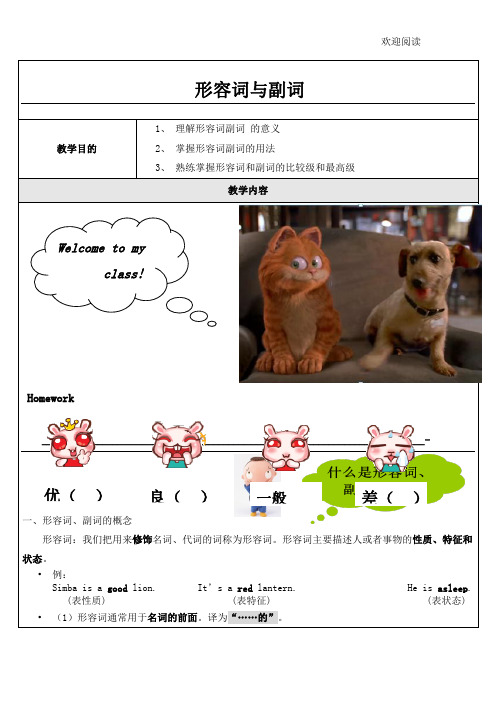
5. I can swim as________( fast ) as the fish, I think.
big
→
bigger
→
biggest
欢迎阅读
其他双音节词和多音节词,在前面加 more, most 来构成比较级和最高级。
原级
比较级
最高级
beautiful
more beautiful
most beautiful
Bill is __ _
Tom.(old)
.汤姆(Tom)比露西(Lucy)高。(tall)
2、形容词或副词的最高级,用于三者或三者以上的人或物的比较,表示人或事物在某个范围内
“最……” 注意:形容词最高级前一定要用 “the”
基本结构是:“A+be+the+最高级+范围” Yao Ming is the tallest in Chinese basketball team. 姚明在中国篮球队里最高。 Cairo is the ___ city in Egypt. (big) . 约翰(John)是班里最聪明的男孩。(clever)
lovely 可爱的
如:
注意 2:有些名词+y 可以变成形容词。
名词
→
形容词
r下雪的
cloud
+y
cloudy 阴天的
salt
salty
咸的
wind
windy 有风的
练一练:
1.Winter is a ________(cold) season of the year.
二、根据句意,用所给形容词或副词的正确形式填空 1.Jim works________(hard), but his brother works________(hard) than him. 2.It’s much________(hot) today than yesterday. 3. Mr Smith is the__________(rich) man in this office. 4. This match is ________(exciting) of the three. 5.My mother is the _______(busy) in my family. 6. Beijing is one of the_________(beautiful) city in China. 7. This book is ________(interesting) than that book. 8. Which goes________(quick), the bus or the car? 9. Look! His hands are____________( big ) than mine. 10. I think you do these things_________( well ) than your classmates. 11. Whose bag is___________( heavy ), yours or mine? 12. Does Jim run as__________( slow ) as David? Yes, but Mike runs _________ ( slow ) than
初中英语形容词(副词)的最高级讲义及练习

形容词(副词)的最高级用法一、定义:当三个或三个以上的人或事物进行比较时,我们需要用到形容词(副词)的最高级。
二、常用句型(1)表达“…是…中最…的”,用“the+形容词(副词)的最高级”的结构,后面可以加上of、in短语,说明比较的范围公式:主语+be动词+the +形容词(副词)最高级+(名词)+of、in短语或从句主语+实义动词+(the)+形容词(副词)最高级+of、in介词短语或从句eg. He is the tallest (student) in our class.He jumps the highest of the three boys.This is the best book that I have ever read.练习:Spring is season of the year.(good)This park is of the three.(beautiful )拓展:1)of+复数”表示“在……之中的”;“在……中”of the four……在四个之中of all(people)在所有的人之中of all the boys 在所有的男孩中of us 在我们之中of all things 在所有的事情当中2)in+范围、场所”译为“在……之中”;“在……之内”in the house 在家中in China 在中国in the world 在世界上in our school 在我们学校in my family 在我们家(2)表示“最…的…中一个”,用“one of +the +最高级+复数名词”的结构来表达。
eg. He is one of the best students in our class.他是我们班最好的学生之一。
This is one of the most beautiful flowers in the garden.这是花园里最漂亮的花之一。
练习:Our city is one of in the world.我们城市是世界上最安全的城市之—.One of languages is English.(important)最重要的语言之一是英语.(3)用于三者或三者以上的比较。
形容词、副词的比较级和最高级讲义

一. 形容词、副词的比较级和最高级一.形容词、副词的级:原级,比较级,最高级二.形容词、副词三个级的用法:1.原级比较,和……一样as +原级+as (否定:not so/as …as)eg. They run quite fast. 他们跑得相当快。
Jimmy is as tall as his father. 吉姆和他的爸爸一样高。
He studies as hard as his brother. 他和他哥哥学习一样努力。
2.二者比较时(用比较级),比较级+thaneg. Helen is taller than me/I (am). 海伦比我高。
She runs faster than he (does). 她跑得比他快。
3.the+最高级+(名词)+范围,表示在……中是最……的eg. The dress is the largest in the shop. 这条裙子是店里最大的。
He runs (the) fastest in our class.■不规则变化:两多两好三不好,一老一远加一少(最高级前要用the,副词最高级前面可省略)四.比较级的其他句型结构1. 表示两者之间的选择,可使用“Which/Who+ 谓语动词+比较级, …or …?●Which one is ______________, this one or that one?A. goodB. badC. bestD. worseeg. Which T-shirt is nicer, this one or that one?2. 比较级+and+比较级或more and more +原级,表示越来越……eg. It becomes warmer and warmer when spring comes.It is getting cooler and cooler.Our school is becoming more and more beautiful.● The weather is becoming ______________.A. hotter and hotterB. more hot and hotC. hoter and hoterD. more and more hot● I like Meishan ___________ because it is becoming __________.A. well; beautifulB. better; more and more beautifulC. well; more and more beautifulD. better; beautiful and beautiful●—I talked with my little uncle on the computer last night.--The internet makes the world _________________.A. small and smallB. smaller and smallerC. small and smallerD. smaller and small3. the+比较级,the+比较级,越……,越……eg. The more we get, the happier we feel.The sooner, the better.The harder you work, the better grades you’ll get.● ___________ you’re, __________ mistakes you’ll make.A. The careful, the lessB. The more careful, the lessC. The more carefully, the fewerD. The more careful, the fewer●–The more you practice, ___________ your English will be.-- I agree. Practice makes perfect.A. the betterB. the worseC. moreD. less4.the+比较级+of,表示两者之间较……的一个eg. Nancy and Lucy are twins. In some way they look the same, but Nancy is the taller of the two.5. 比较级+than+ any+ other+名词(单数),表示比其他任何的……都……(比较级的形式表示最高级的含义)eg. He is taller than any other student in his class.=He is the tallest student in his class.他比他班上的任何一个学生都高。
- 1、下载文档前请自行甄别文档内容的完整性,平台不提供额外的编辑、内容补充、找答案等附加服务。
- 2、"仅部分预览"的文档,不可在线预览部分如存在完整性等问题,可反馈申请退款(可完整预览的文档不适用该条件!)。
- 3、如文档侵犯您的权益,请联系客服反馈,我们会尽快为您处理(人工客服工作时间:9:00-18:30)。
形容词副词定义:中文的意思是“……的”的词是形容词,用来修饰名词;中文意思是“……地”的词是副词,用来修饰动词、形容词或副词形容词与副词在句中的位置形容词形容词的比较级在句中的位置名词所有格副词的比较级形容词副词的转换考点清单练习:练习① It is a ____(sun ) d ay. ② It is a _____(rain ) day.③ I th ink yo u are a _____(luck) g irl. ④ The teach er sai d he had _____to tell us.A . an ything imp or tan t B. im portant anything C. something imp orta nt D. importan t s omet hing⑤ Look !Jack is ____(excite ,exci te d) . ⑥ I fe el ____(happy ) ever y d ay.⑦ Th e bab y is s leeping ,p leas e ke ep______(quiet,qu ietly)考点二:形容词的比较级(1)在形容词词尾加上“er”“est”构成比较级、最高级:bright(明亮的)—brighter—brightestbroad(广阔的)—broader—broadestcheap(便宜的)—cheaper—cheapest clean(干净的)—cleaner—cleanest clever(聪明的)—cleverer—cleverest cold(寒冷的)—colder—coldestcool(凉的)—cooler—coolest dark(黑暗的)—darker—darkestdear(贵的)—dearer—dearestdeep(深的)—deeper—deepestfast(迅速的)—faster—fastestfew(少的)—fewer—fewestgreat(伟大的)—greater—greatest hard(困难的,硬的)—harder—hardesthigh(高的)—higher—highestkind(善良的)—kinder—kindestlight(轻的)—lighter—lightest long(长的)—longer—longestloud(响亮的)—louder—loudest low(低的)—lower—lowestnear(近的)—nearer—nearest new(新的)—newer—newestpoor(穷的)—poorer—poorest quick(快的)—quicker—quickestquiet(安静的)—quieter—quietestrich(富裕的)—richer—richestshort(短的)—shorter—shortest slow(慢的)—slower—slowestsmall(小的)—smaller—smallest smart(聪明的)—smarter—smartest soft(柔软的)—softer—softeststrong(强壮的)—stronger—strongest sweet(甜的)—sweeter—sweetest tall(高的)-taller-tallestthick(厚的)—thicker—thickest warm(温暖的)—warmer—warmestweak(弱的)—weaker—weakest young(年轻的)—younger—youngest (2).双写最后一个字母,再加上“er”“est”构成比较级、最高级:big(大的)—bigger—biggestfat(胖的)—fatter—fattesthot(热的)—hotter—hottestred(红的)—redder—reddestsad(伤心的)—sadder—saddest thin(瘦的)—thinner—thinnestwet(湿的)—wetter—wettest mad(疯的)—madder—maddest(3).以不发音的字母e结尾的形容词,加上“r”“st”构成比较级、最高级:able(能干的)—abler—ablestbrave(勇敢的)—braver—bravestclose(接近的)—closer—closest fine(好的,完美的)—finer—finestlarge(巨大的)—larger—largest late(迟的)—later—latestnice(好的)—nicer—nicestripe(成熟的)—riper—ripestrude(粗鲁的)—ruder—rudest safe(安全的)—safer—safeststrange(奇怪的)—stranger—strangest wide(宽广的)—wider—widestwise(睿智的,聪明的)—wiser—wisest white(白的)—whiter—whitest(4).以字母y结尾的形容词,把y改为i,再加上“er”“est”构成比较级、最高级:busy(忙碌的)—busier—busiest dirty(脏的)—dirtier—dirtiestdry(干燥的)—drier—driest early(早的)—earlier—earliesteasy(容易的)—easier—easiest friendly(友好的)—friendlier—friendliest funny(好玩的)—funnier—funniesthappy(开心的)—happier—happiesthealthy(健康的)—healthier—healthiest heavy(重的)—heavier—heaviesthungry(饿的)—hungrier—hungriest lazy(懒惰的)—lazier—laziestlucky(幸运的)—luckier—luckiest naughty(调皮的)—naughtier—naughtiestnoisy(嘈杂的)—noisier—noisiest pretty(美丽的)—prettier—prettiestsilly(傻的)—sillier—silliest spicy(辣的)—spicier—spiciestthirsty(渴的)—thirstier—thirstiest ugly(丑的)—uglier—ugliest(5).双音节、多音节形容词,在单词前面加上“more”“most”构成比较级、最高级:afraid(害怕的)—moreafraid—mostafraidbeautiful(美丽的)—more beautiful—most beautifulcareful(仔细的)—morecareful—mostcarefulcheerful(开心的)—more cheerful—mostcheerfulcrowded(拥挤的)—more crowded—most crowdeddangerous(危险的)—moredangerous—mostdangerousdelicious(美味的)—moredelicious—mostdeliciousdifficult(困难的)—more difficult—mostdifficultexciting(令人兴奋的)—more exciting—most excitingexpensive(昂贵的)—more expensive—most expensivefamous(著名的)—more famous—mostfamousfrightened(受惊的)—morefrightened—mostfrightenedfrightening(令人害怕的)—more frightening—most frighteninghard-working(勤奋的)—more hard-working—most hard-workinghelpful(有帮助的)—more helpful—mosthelpfulhonest(诚实的)—morehonest—most honestimportant(重要的)—more important—mostimportantinteresting(有趣的)—more interesting—most interestingpolite(有礼貌的)—morepolite—most politeterrible(可怕的)—more terrible—most terribletired(累的)—more tired—most tired(6).不规则变化的形容词:bad(坏的)—worse—worst far(远的)—farther—farthest(far—further—furthest)good(好的)—better—best ill(病的)—worse—worstlittle(少的)—less—least many(多的)—more—most much(多的)—more—most old(年老的)—older—oldest ( old—elder—eldest) well(好的,身体好的)—better—best练习1.Is your friend ____ (young) thanyou ?2. Shanghai is one of ______(big) cities in theworld.3.Do you think English is _____important than maths。
4. Of all thestudents in Jim's class, heis_________A.the youngestB. youngerC. Young5. IsTom____ boyin yourclass?A.tallB. taller C. tallest D.the tallest6. I am 4 cm______ than my sister.A.longer B.taller C. heavier7.Let’s have a resthere. Iamtootired to walk any_____.A.farB.farther C. farthest D.farer8. Lily is12and Lucyis 10. SoLucy is_______than Lily.A.young B.younger C. old D. older真题链接1.Shall we go tothe zoo?----Great!Thatis _____.(锦玉小学2017)A unhappyB difficultC sadD interesting2.I likegreengrass and ___(rain) day. (锦玉小学2017)3.My father_____1.8 meters____. (锦玉小学2017)A has;tall Bis;tall C has;short D is;short4.Bei jing Library has ____(many) booksthan ours.(锦玉小学2017)5.She canjump ____(高得)thanher brother.(锦玉小学2017)6.This T-shirt looks so___on you.(凌云小学2017)A young Bclean C cool D easy7.Autumn is c____ while spring is warm(凌云小学)8.This film isvery____.I don't likeit. (育华小学)A busyB boringC excitingD fun9.I feel ___now,so Iwant tohave arest. (育华小学)A lonelyB lucky Ctired D angry10.Take more exerciseandyou can't keep____.(health)(育华小学)11.It is ___(bright) and great.(育华小学)考点三副词在句中的位置练习1. We shouldlisten tothe teacher ______. (careful ,carefully)2.I can see it ______( clear, clearly).3. She write _____(slow) and _____(careful).考点四副词的比较级1.副词的比较级用法和形容词的比较级一样的变化规则.以词尾-ly 结尾的副词(除early ,earlier earliest)其他须用more 和most 。
